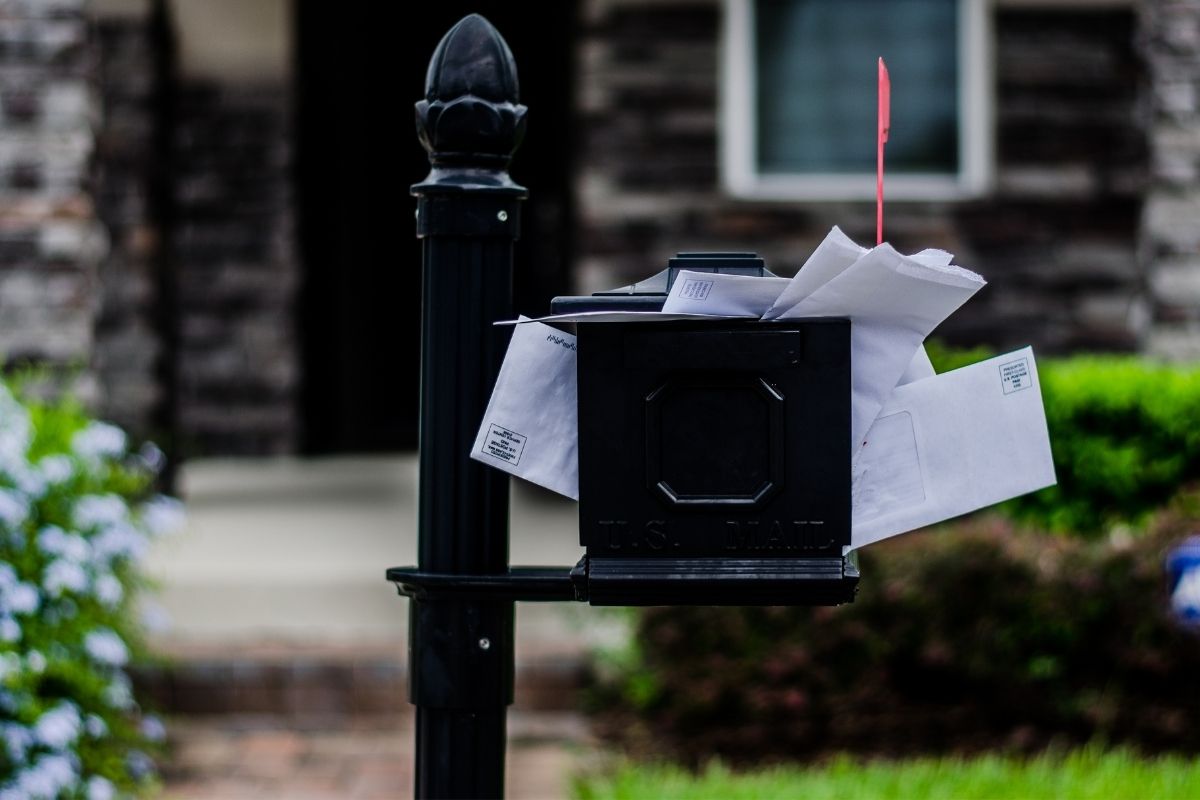Put a Stop to Unwanted Junk Mail
When the mail arrives, do you race out to check it, hoping for a letter or card? Or do you go a few days, or a week, before bothering with it because you know it’s most likely junk mail?
If you’re like most people, you’re not in a hurry to check the mail. Junk mail, such as catalogs, credit card offers, flyers, and coupons, is a large portion of the mail delivered these days.
Why So Much Junk is Delivered
Junk mail, also known as direct mail or standard mail, is any unsolicited mail. It shows up regularly in your mailbox, and it seems there’s no way out. As a result, the companies that send these mailings have negotiated reduced rates with the postal service to send large quantities of paper through the US Postal Service (USPS).
While that certainly keeps the carriers employed, it has downsides, too.

The Problems with Junk Mail
Personal Disruption
First, junk mail impacts your quality of life. How much time do you spend sorting and disposing of unwanted flyers, catalogs, coupons, and the like? We’re willing to bet it also creates a fair amount of clutter in your otherwise neat home.
According to EcoCycle.org, one of the nation’s largest recycling nonprofit, you could spend up to eight months of your life sorting through junk mail! Think about what you could do with that time.
Plus, all the junk mail puts your data at risk. Marketers across the country share your name, address, and buying habits with others, and all those credit card offers leave you open to identity theft.
13 Ways to Protect Yourself from Identity Theft
Junk Mail and the Environment
All that paper whizzing around and mostly tossed in recycling or trash bins isn’t good for the environment. To understand the actual environmental impacts of junk mail, check out these facts from the New York University School of Law:
- 5.6 million tons of direct mail and other unsolicited paper mail wind up in U.S. landfills each year
- 44% of junk mail is thrown away without ever being opened, but only half of that is recycled
- On average, each American household receives 848 pieces of junk mail per year. It amounts to 1.5 trees per family or around 100 million trees per year. To put that in perspective, it’s the equivalent of deforesting Rocky Mountain National Park every four months!
- This deforestation means junk mail manufacturers create as much greenhouse gas emissions yearly as 3.7 million cars.
Helping Seniors with Mail Management

Where Junk Mail Comes From
Companies that use direct mail as a marketing strategy send coupons, flyers, catalogs, and other paper advertisements to mailboxes nationwide. Each company gets your name from public records, phone directories, club memberships, credit applications, and the USPS.
The USPS is legally obligated to deliver all mail, assuming proper postage is attached. However, that doesn’t mean you’re powerless to stop the onslaught of junk mail.
Mid-Year Reset: Organize Your Way to a Fresh Start
Ways to Stop Getting Junk Mail
Opt-Out of Pre-Screened Offers
Some of the most common junk mail includes pre-screened credit cards or insurance offers. Thankfully, you do not need to call each of these companies individually. Because, let’s be honest; that would be a headache and likely not very successful.
Instead, you can opt out of these offers. There are two choices: five years or forever. To start the process, visit optoutprescreen.com or call 1-888-567-8688. Note that the major consumer reporting companies operate the website and phone number.
When you use either of these methods of opting out, you will be asked to provide personal information such as your home phone number, name, social security number, date of birth, and address. It is confidential and will only be used to process your request.
If you’d rather opt out of pre-screened offers by sending your request by mail, use the following addresses for the major reporting companies. You will need to provide them with the same information listed above.

Opt-Out
P.O. Box 703
Allen, TX 75013
Name Removal Option
P.O. Box 505
Woodlyn, PA 19094
Options
P.O. Box 740123
Atlanta, GA 30374
P.O. Box 530088
Atlanta, GA 30353
Opting out of pre-screened offers will not impact your credit score or ability to obtain a loan.
Opt-Out of Direct Mail Offers
If you’re familiar with the National Do Not Call List, the idea behind Direct Mail’s opt-out is that it’s like a “Do Not Mail List.” It’s easy to sign up online.
You also have the option to mail in your opt-out form. There is a fee for this option. To use the mail-in option, send your opt-out request (“I do not wish to receive any unsolicited advertising, sales or other mail solicitations at this address”), along with your name (and all variations thereof), address, and signature along with the processing fee (check or money order payable to DMA) to:
DMAchoice
Data & Marketing Association
P.O. Box 643
Carmel, NY 10512
The ANA’s (Association of National Advertisers) Deceased Do Not Contact List (DDNC) assists in removing deceased individuals’ information from commercial and nonprofit marketing lists to prevent unsolicited communications and respect the privacy of grieving families. The ANA also provides a Do Not Contact List for Caretakers to assist family members, friends, or caretakers in removing the person’s name, address, and email and are permanently placed on the ANA’s DMAchoice (mail opt-out) and eMPS (email opt-out) lists.
Financial Scams and How to Avoid Them
Other companies sell your information to people who send junk mail, so you’ll need to check out these other places as well:
- SKUlocal, formerly Cox Target, is responsible for sending you those promo-coupon-filled Valpaks, among other things
- Save.com, formerly RedPlum & RetailMeNot Everyday (another promo-coupon mailing)
You should also pay attention to other unwanted mailings that have slipped through the cracks despite your best efforts and then contact the senders individually.
Valpak
To unsubscribe from Valpak mailings, visit the Valpak Unsubscribe Request page and fill out a form with your complete address. After submitting the form, it can take several weeks for the mailings to stop due to their advertising programs being prepared in advance. Valpak requests your patience during this process. The company also emphasizes its commitment to environmentally responsible practices, encouraging employees, vendors, and franchisees to engage in environmentally preferable purchasing, waste reduction, energy conservation, and recycling. Sounds good, right?
Spending Triggers and How to Overcome Them
Opt-Out of Catalogs
Catalog Choice provides a free service that allows you to opt out of specific catalogs and paper mail. Their website has nearly 10,000 titles, so do a quick search to see if the ones you want to stop are listed.
Another option is PaperKarma. This easy-to-use app makes it simple to remove yourself from mailing lists with your mobile phone. Using the app, snap a picture of the mail, enter the name and address you want removed from the list, and you’re done!
According to their website, “PaperKarma has 10x as many mailers in its database as Catalog Choice and is the country’s largest, most comprehensive Do Not Mail registry service. And the service is effective in getting rid of 90% of junk mail.” Users who purchase a monthly or yearly plan to access the service provide revenue to fund their operations. PaperKarma keeps all user data confidential and does not rely on advertising or data sales to fund its operations. How refreshing! Visit their website for more information.
Technology for Time Management – A Gateway to Simplified Living

Opt-Out of Magazine Subscriptions
Again, when you subscribe to a magazine, your information is likely to be shared with other magazine subscription services. You can request that they not do this, but the request is often ignored, so it’s best to contact them again in a few weeks to follow up.
Opt-Out of Charitable Requests
We highly encourage philanthropy. But just because you’ve made one donation doesn’t mean you want to make more or want every charitable organization filling your mailbox asking for money.
When you donate, enclose a note requesting they not share your information to curtail this. You can even make future donations conditional upon them following this request. Another option is to ask the charity to decrease or stop the mailings they send. Finally, if you no longer wish to support a charity, you can ask them to remove you from their database. Charity Navigator has an extensive database of charities that pledge not to sell your information.
How Long Do I Have to Keep This?
Refuse Delivery of Promo Mailings
Look for any of the following phrases on any promotional mailing sent to “resident,” “current resident,” or “current occupant”:
- return service requested
- forwarding service requested
- address service requested
- change service requested
- First Class Mail
Mark these “REFUSED, RETURN TO SENDER,” and return them to your mailbox.
Sweepstakes
Sure, entering Publisher’s Clearing House can be fun, but it’s also another source of junk mail. And they likely share your information, too. To opt-out, contact Publishers Clearing House online, email, or by mail at Consumer & Privacy Affairs, Publishers Clearing House, 300 Jericho Quadrangle #300 Jericho, NY 11753.
10 Organization Hacks for a Chaos Free Life

Keeping Junk Mail Out of Your Mailbox
The final step of this process is to contact your banks, credit card companies, and utilities. Tell them not to release your name, address, Social Security number, email address, or phone number to anyone for marketing or promotional reasons. If you do this in writing, do so without giving out any information other than the name on your account. Keep a record of when you made this request and follow up if necessary. Find out your rights as a consumer here at FTC.gov.
What to Do if You Think You’ve Been Hacked
Bonus: Opt-Out of Online Searches
While not directly tied to getting junk mail, being able to be found via an online search isn’t appealing to everyone. If you value your privacy and want to add a layer of protection, check out these tips for removing your name and personal information from online searches.
In a recent article on Komando.com, Kim Komando provides updated instructions on how to remove personal information from various people search sites. As part of her ‘Opt Out Tuesday’ series, she offers weekly guides to help individuals protect their online privacy. Due to the popularity of the series, some sites have changed their opt-out processes. She emphasizes the importance of online privacy and encourages readers to share this information with others.
Have any questions? Drop them below and we’ll answer them!









